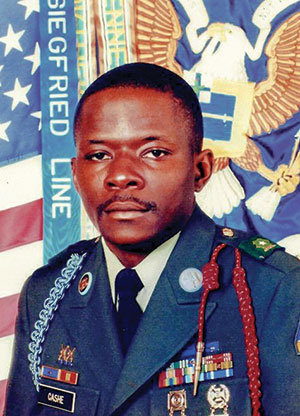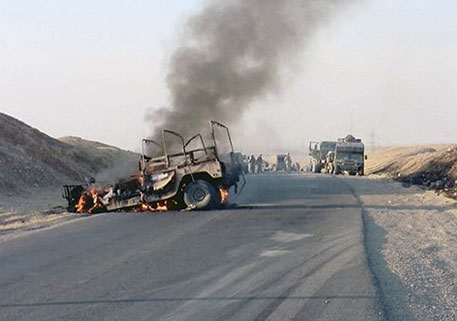
After years of procedural hurdles, Iraq War hero Alwyn Cashe cleared to posthumously receive long-overdue Medal of Honor
Every American armed conflict seems to have at least one service member whose battlefield heroics are known to an entire generation of warfighters, but who—for one reason or another—many feel has not received proper recognition for those actions. For the post-9/11 generation of veterans, that hero is Sgt. 1st Class Alwyn Cashe.
On Oct. 17, 2005, while on his second combat deployment to Iraq since the 2003 invasion, the Bradley Fighting Vehicle he was in ran over an improvised explosive device in the city of Daliaya. The blast ruptured the Bradley’s fuel cell and spread gasoline throughout the vehicle’s hull, completely disabling it and engulfing it in flames. Cashe, who was manning the turret, was only slightly injured but drenched in fuel.
As soon as the Bradley screeched to a halt, the vehicle and its crew began taking incoming fire. Seeing the driver was on fire, Cashe climbed out of the gun turret to pull him out of his hatch. After extinguishing the driver’s flames and pulling him to safety, Cashe returned to the vehicle to get the six other soldiers and their Iraqi translator out of the firestorm inside the payload compartment. That’s when Cashe caught fire himself.
Cashe returned to the Bradley multiple times to make sure every soldier was pulled out alive, ignoring the flames as they burned away his personal protective equipment. Though his uniform was melted to his skin, he refused treatment until all of his soldiers were taken and cared for first. Eventually, medical personnel at Balad Air Base were able to begin treating his extensive injuries.
“The surgeons worked for hours on his wounds, and we worked for hours in the intensive care unit to stabilize him for transport. In the end, damage to his lungs made him too sick to be safely transported by plane to our hospital in Germany and then on to a burn center in San Antonio,” then-Maj. Mark Rasnake, an Air Force infectious disease specialist, wrote in a letter home to Cashe’s family. “Our air evac team loaded him into the plane for the six-hour flight to Germany. They had to deliver every breath to him during that flight by squeezing a small bag by hand.”
By the time Cashe reached Germany for additional treatment, 72% of his body was covered in second- and third-degree burns. He was then transferred to Brooke Army Medical Center in Texas before succumbing to his injuries there on Nov. 8, 2005, leaving behind a wife, two daughters and a son. He was 35.
“My brother told me an officer once asked him why, when they were in a danger zone, he was always out front,” his brother, Karlos Cashe, said during his funeral, according to The Orlando Sentinel. “He told me that he said, ‘I’m at peace with myself and God, and some of these other guys might not have reached that point yet.’ That was my brother.”
Four of the soldiers he saved that day ultimately succumbed to their injuries as well, but for his actions, Cashe was posthumously awarded the Silver Star and Purple Heart.
Many of those who were privy to the facts of the attack felt Cashe was deserving of the Medal of Honor, but Army officials contended at the time that his actions did not meet the active combat criterion in order for it to be awarded. Initial reports did not include the detail of incoming enemy gunfire. But after those facts came to light, Cashe’s battalion commander, then-Col. Gary Brito, launched a campaign to have his award upgraded to the Medal of Honor.
That nomination was submitted to the Army in May 2011 but seemingly got lost in Pentagon bureaucracy, as can often happen in the extensive Medal of Honor recommendation process. One such hurdle included a five-year procedural limit on awarding the medal.
Meanwhile, Cashe’s many advocates continued pushing for an upgrade until, in August 2020, then-Defense Secretary Mark Esper completed his review of the case and wrote a letter to lawmakers indicating he would support such an upgrade and requested Congress to pass legislation that waived the five-year limit.
Reps. Stephanie Murphy and Michael Waltz of Cashe’s home state of Florida, as well as Rep. Dan Crenshaw of Texas, then took action by introducing the individual waiver legislation.
“For well over a decade, there has been a painstaking effort by Cashe’s family, friends, and former comrades to have his Silver Star upgraded to the Medal of Honor, which is clearly justified by the facts of this case,” Murphy said in a statement about the bill. “My colleagues and I are working together to remove the one remaining technical obstacle that stands in the way of this incredible soldier receiving the recognition he earned.”
In September 2020, the legislation was approved and later signed into law, clearing the way for Cashe to receive the Medal of Honor. However, an additional measure to award the medal must still be submitted by the Department of Defense and approved by the president to finalize it.
If the move is made, Cashe would become the first African American to receive the Medal of Honor for actions in Iraq or Afghanistan.
“Everybody that has been on this path and remained faithful helped us learn about a different side of my brother,” Kasinal White, Cashe’s sister, said at a press conference when the legislation was approved. “We knew his positive and generous side, but we didn’t know about his military side and what he did.
“They’ve given us pictures we probably never would have gotten.”
And once he is awarded the Medal of Honor, Cashe’s picture will hang in the Pentagon’s Hall of Heroes, immortalized among post-9/11 veterans and generations of American warfighters to come.






